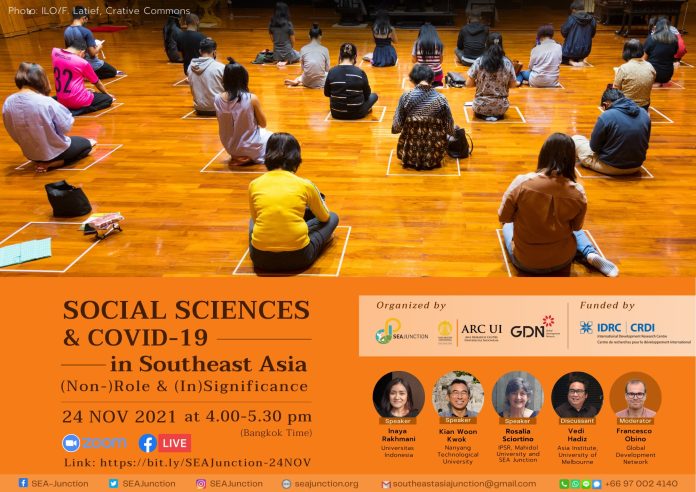November 24, 2021
CSO Event
in Thailand
The Southeast Asia Junction (SEA Junction), Global Development Network, and Asia Research Center of the University of Indonesia will organize a webinar titled “Social Sciences and COVID-19 in Southeast Asia: (Non-)Role and (In)Significance” on November 24, 2021, 4.00-5.30 pm (Bangkok/Jakarta Time).
The outbreak of the COVID-19 in Southeast Asia, as in the rest of the world, has exposed the interaction of biological and socio-economic processes; the implications of health and socio-economic inequity on people well-being; and the political dimensions of health and health governance. Clearly the pandemic is caused by a virus, but understanding it, controlling it and reducing its human costs depends also on social knowledge and interventions. This raises the question: To what degree social science and scientists have been involved in national COVID-19 responses across the region to address the pandemic’s multi-dimensional effects? To reflect on this, SEA Junction in collaboration with the Asia Research Center at the University of Indonesia (ARC-UI) and the Global Development Network (GDN) will host two online debates. The first will take place on Friday 19th November 2021, 5.00-6.30 pm (Bangkok time, GMT+7) in Thai, and will focus on the experience of Thailand. The second will take place on 24 November, 4.00 to 5.30 pm (Bangkok time, GMT+7) in English, and will focus on the experience of countries in the region as a whole.
Both panels are part of a research project co-led by ARC-UI and GDN and funded by the International Development Research Centre (IDRC) of Canada –in which SEA Junction was involved. The project looked at the role of social sciences in COVID-19 responses across 11 countries in South and South East Asia and examined the formal inclusion of social science knowledge and scientists in the COVID response mechanisms; the funding for social research in regards to the pandemic; the research-policy interactions; and the emerging research and initiatives led by social scientists in the region. At the heart of this project is the belief that thriving and independent social sciences are key to illuminating the social, economic, political, psychological and cultural determinants of health and societal resilience, within and across nations, and that social sciences have a key role to play not only in ‘normal’ times, but also during crises. Yet, the experience of the region during the on-going COVID-19 crisis compels us to more openly articulate the urgency of social scientists’ contribution as part of a comprehensive narrative and effective response to this pandemic.
In the first event, to be held in Thai, researcher Vinissa Kattiya-aree will present the findings of the study on Thailand, while experts from Thai institutions will be invited to share their views on the degree of mobilisation of social science knowledge in pandemic response in the country. The panel will be held on site on SEA Junction’s premises at BACC, and broadcast on SEA Junction’s Facebook page.
The second event will be held in English. Researchers from Indonesia, Singapore and Thailand will present the findings of the study and discuss them with the public:
Moderator:
– Francesco Obino, Head of Programs, Global Development Network
– Francesco Obino, Head of Programs, Global Development Network
Discussant:
– Dr. Vedi Hadiz, Director and Professor of Asian Studies at the Asia Institute, the University of Melbourne
– Dr. Vedi Hadiz, Director and Professor of Asian Studies at the Asia Institute, the University of Melbourne
Speakers:
– Dr. Inaya Rakhmani, Director, ARC-UI, Indonesia
– Dr. Kian Woon Kwok, Professor & Associate Vice-President (Wellbeing), Nanyang Technological University, Singapore
– Dr. Rosalia Sciortino, Associate Professor Institute for Population and Social Research (IPSR), Mahidol University and Director, SEA Junction, Thailand
– Dr. Inaya Rakhmani, Director, ARC-UI, Indonesia
– Dr. Kian Woon Kwok, Professor & Associate Vice-President (Wellbeing), Nanyang Technological University, Singapore
– Dr. Rosalia Sciortino, Associate Professor Institute for Population and Social Research (IPSR), Mahidol University and Director, SEA Junction, Thailand
To join the webinar, click https://bit.ly/SEAJunction-24NOV or via SEA Junction’s Facebook page.


